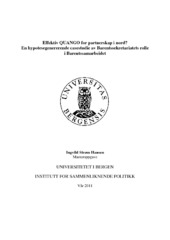| dc.contributor.author | Hansen, Ingvild Strøm | eng |
| dc.date.accessioned | 2011-09-05T07:56:27Z | |
| dc.date.available | 2011-09-05T07:56:27Z | |
| dc.date.issued | 2011-06-03 | eng |
| dc.date.submitted | 2011-06-03 | eng |
| dc.identifier.uri | https://hdl.handle.net/1956/4939 | |
| dc.description.abstract | Formålet med denne casestudien har vært å beskrive hvilken rolle Barentssekretariatet spiller i Barentssamarbeidet, og hvorvidt Sekretariatets rolle har implikasjoner for det regionale og nasjonale politiske nivå på norsk side i Barentssamarbeidet. Barentssekretariatet har tidligere blitt evaluert av en rekke ulike forskningsinstitusjoner. Felles for disse studiene har vært et fokus på Sekretariatets praktiske virke. Til forskjell fra tidligere studier vil denne masteroppgaven sette Barentssekretariatet inn i en bredere politisk kontekst. Et innovativt teoretisk rammeverk som fokuserer på partnerskap og rollen til quasi-autonomous non-governmental organizations, såkalte QUANGOS, har lagt føringer for hva som har vært interessant å undersøke i dybden samt for hvordan oppgaven er strukturert. Hensikten har ikke vært å teste hvorvidt teori styrkes eller svekkes i empiri. I stedet har det teoretiske rammeverket vært benyttet for å få frem nye sider ved Barentssekretariatets rolle. Casestudien har tatt form både som ateoretisk, fortolkende og hypotesegenererende. Avslutningsvis vil det derfor utledes fire hypoteser om Sekretariatets rolle. | en_US |
| dc.description.abstract | The purpose of this case study is to describe the role the Barents Secretariat plays in the Barents Cooperation, and whether its role has and has had implications for the Norwegian political processes at regional and national level in the Cooperation. Different research institutions have previously evaluated the Secretariat. However, these have solely focused on the Secretariat and its internal functions. To the contrary, this thesis will attempt to understand the Secretariat's role in a wider political context. An innovative theoretical framework focusing on partnership and the role of quasi-autonomous non-governmental organizations, namely QUANGOs, will be applied to find relevant and interesting aspects of the Secretariat's role that will be further studied in the thesis. Further, the thesis will be structured around the theoretical framework. The purpose of this thesis is not to test whether the empirical evidence supports or weakens the theories. Rather, the theoretical framework is utilized in order to expose new sides of the Secretariat's role. The case study is hence atheoretical, interpretative, and hypothesizing. Consequently, four hypotheses regarding the Secretariat's role in the Barents Cooperation are generated. | en_US |
| dc.format.extent | 506238 bytes | eng |
| dc.format.mimetype | application/pdf | eng |
| dc.language.iso | nob | eng |
| dc.publisher | The University of Bergen | eng |
| dc.title | Effektiv QUANGO for partnerskap i nord? en hypotesegenererende casestudie av Barentssekretariatets rolle i Barentssamarbeidet | eng |
| dc.type | Master thesis | en_US |
| dc.description.degree | Master i Sammenliknende politikk | |
| dc.description.localcode | SAMPOL350 | |
| dc.description.localcode | MASV-SAPO | |
| dc.subject.nus | 731114 | eng |
| dc.subject.nsi | VDP::Social science: 200::Political science and organizational theory: 240::Comparative politics: 241 | eng |
| fs.subjectcode | SAMPOL350 | |
